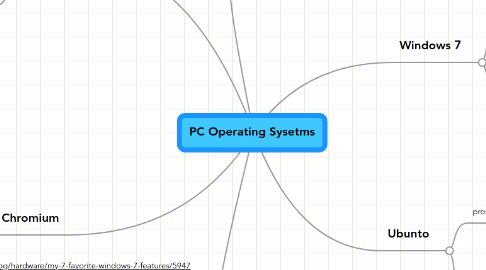
1. Operating System Definition
1.1. An operating system is the software on a computer that manages the way different programs use its hardware, and regulates the ways that a user controls the computer
2. Chromium
2.1. pros
2.1.1. Chrome Beta Updates with Faster Speeds, Preference Syncing
2.1.2. Recent History Gives Chrome a Better History
2.2. cons
2.2.1. Chrome OS is still very much in the research stage, with devices not expected until late 2010.
2.2.2. Google Chrome OS code will only be supported by Google and its partners, and will only run on hardware designed for the purpose.
3. OS X
3.1. cons
3.1.1. you can't simply install OS X wherever and expect full compatibility.
3.1.2. Some of these bugs have been causing major problems, such as programs crashing or freezing, unbootable drives and data loss and/or drive corruption.
3.2. pros
3.2.1. Dock's new three-dimensional, transparent look. It makes the Dock less obtrusive.
3.2.2. OSX’s UNIX base (which has been under development a lot longer than Windows) and UNIX security model lead to a much more stable operating system.
4. Links
4.1. http://www.zdnet.com/blog/hardware/my-7-favorite-windows-7-features/5947
4.2. http://news.cnet.com/8301-30684_3-10402653-265.html
4.3. http://blog.hafees.com/windows/windows-linux-and-mac-a-comparison/
4.4. http://www.zdnet.com/blog/hardware/my-7-favorite-windows-7-features/5947
4.5. http://www.zdnet.com/blog/btl/yes-ubuntu-can-absolutely-be-the-default-windows-alternative/26606
4.6. http://packratstudios.com/index.php/2008/04/06/the-pros-and-cons-of-linux-windows-and-osx/
4.7. http://news.softpedia.com/news/OS-X-on-PCs-Pros-and-Cons-105552.shtml
5. Ubunto
5.1. pros
5.1.1. making sure that Ubuntu gets pre-installed and Ubuntu is available from Dell.com and others and making sure that Ubuntu is the default alternative to Windows.”
5.1.2. viable alternative to Windows for many users despite the apparent quality of both Windows 7 and Server 2008.
5.2. cons
5.2.1. Unless you’re luck to get a CD, you do have to mess about with .ISO files and burn a disc.
6. Windows 7
6.1. pros
6.1.1. Most popular operating system
6.1.2. Applications & driver support – Undoubtedly Windows has the most number of applications
6.2. cons
6.2.1. Not free, restricted, no freedom
6.2.2. Because of the high usage, most spywares and viruses are targeted to this platform.
